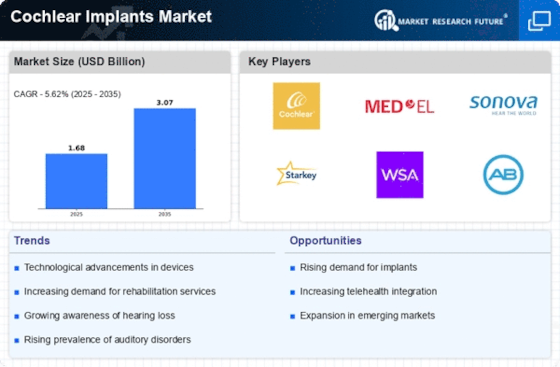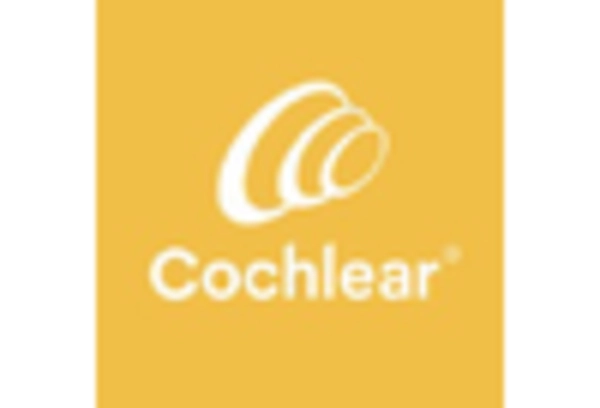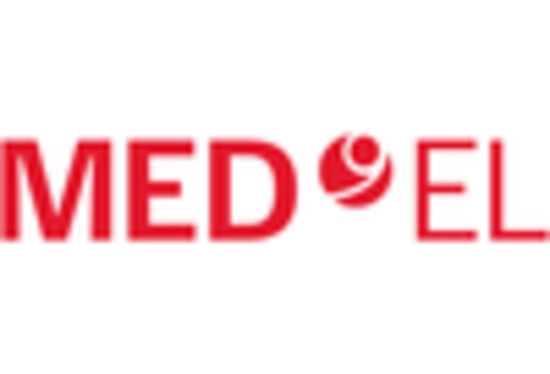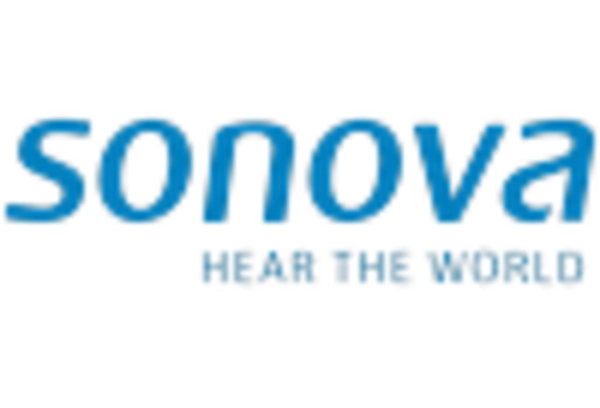Classic Cochlear Implants
Advanced Cochlear Implants
Bilateral Cochlear Implants
Hybrid Cochlear Implants
Children
Adults
Elderly
Electroacoustic Stimulation
Single Electrode Array
Multichannel Cochlear Implants
Hospitals
Specialized Clinics
Online Retail
North America
Europe
South America
Asia Pacific
Middle East and Africa
North America Outlook (USD Billion, 2019-2035)
North America Cochlear Implants Market by Product Type
Classic Cochlear Implants
Advanced Cochlear Implants
Bilateral Cochlear Implants
Hybrid Cochlear Implants
North America Cochlear Implants Market by End User Type
Children
Adults
Elderly
North America Cochlear Implants Market by Technology Type
Electroacoustic Stimulation
Single Electrode Array
Multichannel Cochlear Implants
North America Cochlear Implants Market by Distribution Channel Type
Hospitals
Specialized Clinics
Online Retail
North America Cochlear Implants Market by Regional Type
US
Canada
US Outlook (USD Billion, 2019-2035)
US Cochlear Implants Market by Product Type
Classic Cochlear Implants
Advanced Cochlear Implants
Bilateral Cochlear Implants
Hybrid Cochlear Implants
US Cochlear Implants Market by End User Type
Children
Adults
Elderly
US Cochlear Implants Market by Technology Type
Electroacoustic Stimulation
Single Electrode Array
Multichannel Cochlear Implants
US Cochlear Implants Market by Distribution Channel Type
Hospitals
Specialized Clinics
Online Retail
CANADA Outlook (USD Billion, 2019-2035)
CANADA Cochlear Implants Market by Product Type
Classic Cochlear Implants
Advanced Cochlear Implants
Bilateral Cochlear Implants
Hybrid Cochlear Implants
CANADA Cochlear Implants Market by End User Type
Children
Adults
Elderly
CANADA Cochlear Implants Market by Technology Type
Electroacoustic Stimulation
Single Electrode Array
Multichannel Cochlear Implants
CANADA Cochlear Implants Market by Distribution Channel Type
Hospitals
Specialized Clinics
Online Retail
Europe Outlook (USD Billion, 2019-2035)
Europe Cochlear Implants Market by Product Type
Classic Cochlear Implants
Advanced Cochlear Implants
Bilateral Cochlear Implants
Hybrid Cochlear Implants
Europe Cochlear Implants Market by End User Type
Children
Adults
Elderly
Europe Cochlear Implants Market by Technology Type
Electroacoustic Stimulation
Single Electrode Array
Multichannel Cochlear Implants
Europe Cochlear Implants Market by Distribution Channel Type
Hospitals
Specialized Clinics
Online Retail
Europe Cochlear Implants Market by Regional Type
Germany
UK
France
Russia
Italy
Spain
Rest of Europe
GERMANY Outlook (USD Billion, 2019-2035)
GERMANY Cochlear Implants Market by Product Type
Classic Cochlear Implants
Advanced Cochlear Implants
Bilateral Cochlear Implants
Hybrid Cochlear Implants
GERMANY Cochlear Implants Market by End User Type
Children
Adults
Elderly
GERMANY Cochlear Implants Market by Technology Type
Electroacoustic Stimulation
Single Electrode Array
Multichannel Cochlear Implants
GERMANY Cochlear Implants Market by Distribution Channel Type
Hospitals
Specialized Clinics
Online Retail
UK Outlook (USD Billion, 2019-2035)
UK Cochlear Implants Market by Product Type
Classic Cochlear Implants
Advanced Cochlear Implants
Bilateral Cochlear Implants
Hybrid Cochlear Implants
UK Cochlear Implants Market by End User Type
Children
Adults
Elderly
UK Cochlear Implants Market by Technology Type
Electroacoustic Stimulation
Single Electrode Array
Multichannel Cochlear Implants
UK Cochlear Implants Market by Distribution Channel Type
Hospitals
Specialized Clinics
Online Retail
FRANCE Outlook (USD Billion, 2019-2035)
FRANCE Cochlear Implants Market by Product Type
Classic Cochlear Implants
Advanced Cochlear Implants
Bilateral Cochlear Implants
Hybrid Cochlear Implants
FRANCE Cochlear Implants Market by End User Type
Children
Adults
Elderly
FRANCE Cochlear Implants Market by Technology Type
Electroacoustic Stimulation
Single Electrode Array
Multichannel Cochlear Implants
FRANCE Cochlear Implants Market by Distribution Channel Type
Hospitals
Specialized Clinics
Online Retail
RUSSIA Outlook (USD Billion, 2019-2035)
RUSSIA Cochlear Implants Market by Product Type
Classic Cochlear Implants
Advanced Cochlear Implants
Bilateral Cochlear Implants
Hybrid Cochlear Implants
RUSSIA Cochlear Implants Market by End User Type
Children
Adults
Elderly
RUSSIA Cochlear Implants Market by Technology Type
Electroacoustic Stimulation
Single Electrode Array
Multichannel Cochlear Implants
RUSSIA Cochlear Implants Market by Distribution Channel Type
Hospitals
Specialized Clinics
Online Retail
ITALY Outlook (USD Billion, 2019-2035)
ITALY Cochlear Implants Market by Product Type
Classic Cochlear Implants
Advanced Cochlear Implants
Bilateral Cochlear Implants
Hybrid Cochlear Implants
ITALY Cochlear Implants Market by End User Type
Children
Adults
Elderly
ITALY Cochlear Implants Market by Technology Type
Electroacoustic Stimulation
Single Electrode Array
Multichannel Cochlear Implants
ITALY Cochlear Implants Market by Distribution Channel Type
Hospitals
Specialized Clinics
Online Retail
SPAIN Outlook (USD Billion, 2019-2035)
SPAIN Cochlear Implants Market by Product Type
Classic Cochlear Implants
Advanced Cochlear Implants
Bilateral Cochlear Implants
Hybrid Cochlear Implants
SPAIN Cochlear Implants Market by End User Type
Children
Adults
Elderly
SPAIN Cochlear Implants Market by Technology Type
Electroacoustic Stimulation
Single Electrode Array
Multichannel Cochlear Implants
SPAIN Cochlear Implants Market by Distribution Channel Type
Hospitals
Specialized Clinics
Online Retail
REST OF EUROPE Outlook (USD Billion, 2019-2035)
REST OF EUROPE Cochlear Implants Market by Product Type
Classic Cochlear Implants
Advanced Cochlear Implants
Bilateral Cochlear Implants
Hybrid Cochlear Implants
REST OF EUROPE Cochlear Implants Market by End User Type
Children
Adults
Elderly
REST OF EUROPE Cochlear Implants Market by Technology Type
Electroacoustic Stimulation
Single Electrode Array
Multichannel Cochlear Implants
REST OF EUROPE Cochlear Implants Market by Distribution Channel Type
Hospitals
Specialized Clinics
Online Retail
APAC Outlook (USD Billion, 2019-2035)
APAC Cochlear Implants Market by Product Type
Classic Cochlear Implants
Advanced Cochlear Implants
Bilateral Cochlear Implants
Hybrid Cochlear Implants
APAC Cochlear Implants Market by End User Type
Children
Adults
Elderly
APAC Cochlear Implants Market by Technology Type
Electroacoustic Stimulation
Single Electrode Array
Multichannel Cochlear Implants
APAC Cochlear Implants Market by Distribution Channel Type
Hospitals
Specialized Clinics
Online Retail
APAC Cochlear Implants Market by Regional Type
China
India
Japan
South Korea
Malaysia
Thailand
Indonesia
Rest of APAC
CHINA Outlook (USD Billion, 2019-2035)
CHINA Cochlear Implants Market by Product Type
Classic Cochlear Implants
Advanced Cochlear Implants
Bilateral Cochlear Implants
Hybrid Cochlear Implants
CHINA Cochlear Implants Market by End User Type
Children
Adults
Elderly
CHINA Cochlear Implants Market by Technology Type
Electroacoustic Stimulation
Single Electrode Array
Multichannel Cochlear Implants
CHINA Cochlear Implants Market by Distribution Channel Type
Hospitals
Specialized Clinics
Online Retail
INDIA Outlook (USD Billion, 2019-2035)
INDIA Cochlear Implants Market by Product Type
Classic Cochlear Implants
Advanced Cochlear Implants
Bilateral Cochlear Implants
Hybrid Cochlear Implants
INDIA Cochlear Implants Market by End User Type
Children
Adults
Elderly
INDIA Cochlear Implants Market by Technology Type
Electroacoustic Stimulation
Single Electrode Array
Multichannel Cochlear Implants
INDIA Cochlear Implants Market by Distribution Channel Type
Hospitals
Specialized Clinics
Online Retail
JAPAN Outlook (USD Billion, 2019-2035)
JAPAN Cochlear Implants Market by Product Type
Classic Cochlear Implants
Advanced Cochlear Implants
Bilateral Cochlear Implants
Hybrid Cochlear Implants
JAPAN Cochlear Implants Market by End User Type
Children
Adults
Elderly
JAPAN Cochlear Implants Market by Technology Type
Electroacoustic Stimulation
Single Electrode Array
Multichannel Cochlear Implants
JAPAN Cochlear Implants Market by Distribution Channel Type
Hospitals
Specialized Clinics
Online Retail
SOUTH KOREA Outlook (USD Billion, 2019-2035)
SOUTH KOREA Cochlear Implants Market by Product Type
Classic Cochlear Implants
Advanced Cochlear Implants
Bilateral Cochlear Implants
Hybrid Cochlear Implants
SOUTH KOREA Cochlear Implants Market by End User Type
Children
Adults
Elderly
SOUTH KOREA Cochlear Implants Market by Technology Type
Electroacoustic Stimulation
Single Electrode Array
Multichannel Cochlear Implants
SOUTH KOREA Cochlear Implants Market by Distribution Channel Type
Hospitals
Specialized Clinics
Online Retail
MALAYSIA Outlook (USD Billion, 2019-2035)
MALAYSIA Cochlear Implants Market by Product Type
Classic Cochlear Implants
Advanced Cochlear Implants
Bilateral Cochlear Implants
Hybrid Cochlear Implants
MALAYSIA Cochlear Implants Market by End User Type
Children
Adults
Elderly
MALAYSIA Cochlear Implants Market by Technology Type
Electroacoustic Stimulation
Single Electrode Array
Multichannel Cochlear Implants
MALAYSIA Cochlear Implants Market by Distribution Channel Type
Hospitals
Specialized Clinics
Online Retail
THAILAND Outlook (USD Billion, 2019-2035)
THAILAND Cochlear Implants Market by Product Type
Classic Cochlear Implants
Advanced Cochlear Implants
Bilateral Cochlear Implants
Hybrid Cochlear Implants
THAILAND Cochlear Implants Market by End User Type
Children
Adults
Elderly
THAILAND Cochlear Implants Market by Technology Type
Electroacoustic Stimulation
Single Electrode Array
Multichannel Cochlear Implants
THAILAND Cochlear Implants Market by Distribution Channel Type
Hospitals
Specialized Clinics
Online Retail
INDONESIA Outlook (USD Billion, 2019-2035)
INDONESIA Cochlear Implants Market by Product Type
Classic Cochlear Implants
Advanced Cochlear Implants
Bilateral Cochlear Implants
Hybrid Cochlear Implants
INDONESIA Cochlear Implants Market by End User Type
Children
Adults
Elderly
INDONESIA Cochlear Implants Market by Technology Type
Electroacoustic Stimulation
Single Electrode Array
Multichannel Cochlear Implants
INDONESIA Cochlear Implants Market by Distribution Channel Type
Hospitals
Specialized Clinics
Online Retail
REST OF APAC Outlook (USD Billion, 2019-2035)
REST OF APAC Cochlear Implants Market by Product Type
Classic Cochlear Implants
Advanced Cochlear Implants
Bilateral Cochlear Implants
Hybrid Cochlear Implants
REST OF APAC Cochlear Implants Market by End User Type
Children
Adults
Elderly
REST OF APAC Cochlear Implants Market by Technology Type
Electroacoustic Stimulation
Single Electrode Array
Multichannel Cochlear Implants
REST OF APAC Cochlear Implants Market by Distribution Channel Type
Hospitals
Specialized Clinics
Online Retail
South America Outlook (USD Billion, 2019-2035)
South America Cochlear Implants Market by Product Type
Classic Cochlear Implants
Advanced Cochlear Implants
Bilateral Cochlear Implants
Hybrid Cochlear Implants
South America Cochlear Implants Market by End User Type
Children
Adults
Elderly
South America Cochlear Implants Market by Technology Type
Electroacoustic Stimulation
Single Electrode Array
Multichannel Cochlear Implants
South America Cochlear Implants Market by Distribution Channel Type
Hospitals
Specialized Clinics
Online Retail
South America Cochlear Implants Market by Regional Type
Brazil
Mexico
Argentina
Rest of South America
BRAZIL Outlook (USD Billion, 2019-2035)
BRAZIL Cochlear Implants Market by Product Type
Classic Cochlear Implants
Advanced Cochlear Implants
Bilateral Cochlear Implants
Hybrid Cochlear Implants
BRAZIL Cochlear Implants Market by End User Type
Children
Adults
Elderly
BRAZIL Cochlear Implants Market by Technology Type
Electroacoustic Stimulation
Single Electrode Array
Multichannel Cochlear Implants
BRAZIL Cochlear Implants Market by Distribution Channel Type
Hospitals
Specialized Clinics
Online Retail
MEXICO Outlook (USD Billion, 2019-2035)
MEXICO Cochlear Implants Market by Product Type
Classic Cochlear Implants
Advanced Cochlear Implants
Bilateral Cochlear Implants
Hybrid Cochlear Implants
MEXICO Cochlear Implants Market by End User Type
Children
Adults
Elderly
MEXICO Cochlear Implants Market by Technology Type
Electroacoustic Stimulation
Single Electrode Array
Multichannel Cochlear Implants
MEXICO Cochlear Implants Market by Distribution Channel Type
Hospitals
Specialized Clinics
Online Retail
ARGENTINA Outlook (USD Billion, 2019-2035)
ARGENTINA Cochlear Implants Market by Product Type
Classic Cochlear Implants
Advanced Cochlear Implants
Bilateral Cochlear Implants
Hybrid Cochlear Implants
ARGENTINA Cochlear Implants Market by End User Type
Children
Adults
Elderly
ARGENTINA Cochlear Implants Market by Technology Type
Electroacoustic Stimulation
Single Electrode Array
Multichannel Cochlear Implants
ARGENTINA Cochlear Implants Market by Distribution Channel Type
Hospitals
Specialized Clinics
Online Retail
REST OF SOUTH AMERICA Outlook (USD Billion, 2019-2035)
REST OF SOUTH AMERICA Cochlear Implants Market by Product Type
Classic Cochlear Implants
Advanced Cochlear Implants
Bilateral Cochlear Implants
Hybrid Cochlear Implants
REST OF SOUTH AMERICA Cochlear Implants Market by End User Type
Children
Adults
Elderly
REST OF SOUTH AMERICA Cochlear Implants Market by Technology Type
Electroacoustic Stimulation
Single Electrode Array
Multichannel Cochlear Implants
REST OF SOUTH AMERICA Cochlear Implants Market by Distribution Channel Type
Hospitals
Specialized Clinics
Online Retail
MEA Outlook (USD Billion, 2019-2035)
MEA Cochlear Implants Market by Product Type
Classic Cochlear Implants
Advanced Cochlear Implants
Bilateral Cochlear Implants
Hybrid Cochlear Implants
MEA Cochlear Implants Market by End User Type
Children
Adults
Elderly
MEA Cochlear Implants Market by Technology Type
Electroacoustic Stimulation
Single Electrode Array
Multichannel Cochlear Implants
MEA Cochlear Implants Market by Distribution Channel Type
Hospitals
Specialized Clinics
Online Retail
MEA Cochlear Implants Market by Regional Type
GCC Countries
South Africa
Rest of MEA
GCC COUNTRIES Outlook (USD Billion, 2019-2035)
GCC COUNTRIES Cochlear Implants Market by Product Type
Classic Cochlear Implants
Advanced Cochlear Implants
Bilateral Cochlear Implants
Hybrid Cochlear Implants
GCC COUNTRIES Cochlear Implants Market by End User Type
Children
Adults
Elderly
GCC COUNTRIES Cochlear Implants Market by Technology Type
Electroacoustic Stimulation
Single Electrode Array
Multichannel Cochlear Implants
GCC COUNTRIES Cochlear Implants Market by Distribution Channel Type
Hospitals
Specialized Clinics
Online Retail
SOUTH AFRICA Outlook (USD Billion, 2019-2035)
SOUTH AFRICA Cochlear Implants Market by Product Type
Classic Cochlear Implants
Advanced Cochlear Implants
Bilateral Cochlear Implants
Hybrid Cochlear Implants
SOUTH AFRICA Cochlear Implants Market by End User Type
Children
Adults
Elderly
SOUTH AFRICA Cochlear Implants Market by Technology Type
Electroacoustic Stimulation
Single Electrode Array
Multichannel Cochlear Implants
SOUTH AFRICA Cochlear Implants Market by Distribution Channel Type
Hospitals
Specialized Clinics
Online Retail
REST OF MEA Outlook (USD Billion, 2019-2035)
REST OF MEA Cochlear Implants Market by Product Type
Classic Cochlear Implants
Advanced Cochlear Implants
Bilateral Cochlear Implants
Hybrid Cochlear Implants
REST OF MEA Cochlear Implants Market by End User Type
Children
Adults
Elderly
REST OF MEA Cochlear Implants Market by Technology Type
Electroacoustic Stimulation
Single Electrode Array
Multichannel Cochlear Implants
REST OF MEA Cochlear Implants Market by Distribution Channel Type
Hospitals
Specialized Clinics
Online Retail

















Leave a Comment